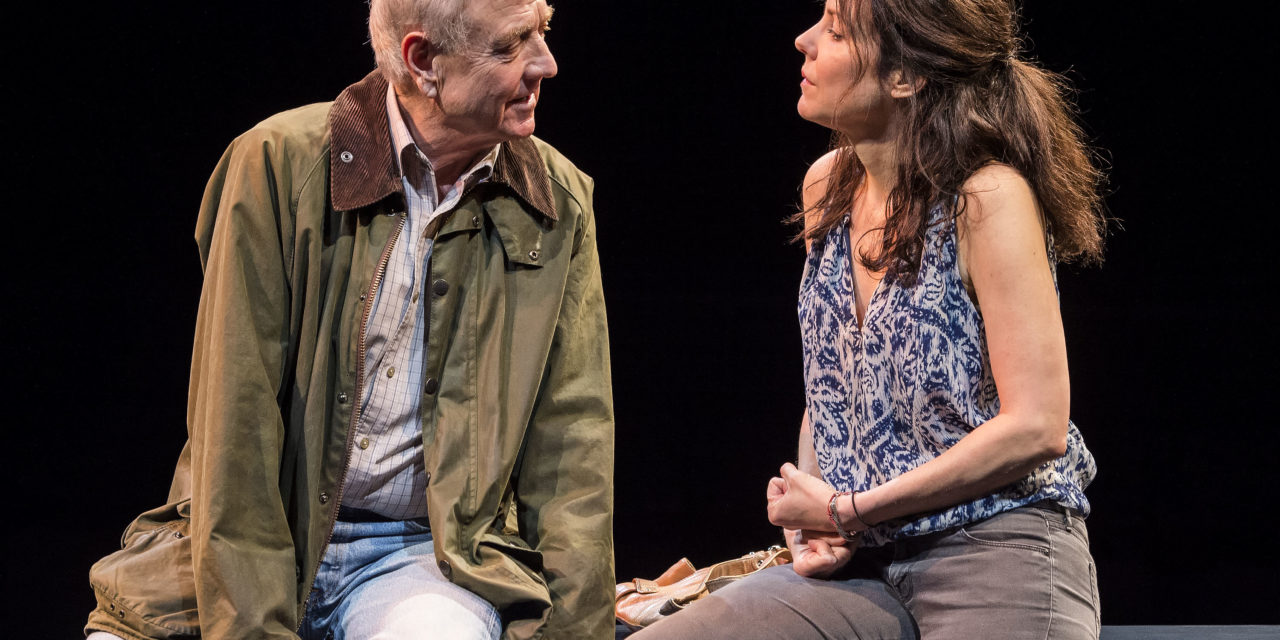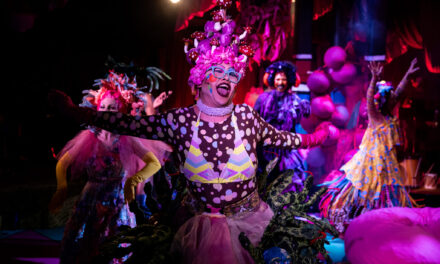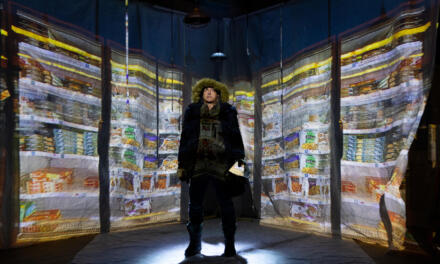As Los Angeles’ leading non-profit theatre company, The Centre Theatre Group is known for hosting productions that sometimes move to New York and bringing productions from New York to the LA stage through their relationship with institutions like the Manhattan Theatre Club. The Mark Taper Forum benefits from these efforts with Tony Award and two-time Olivier Award winner Simon Stephens’ play Heisenberg. The play first premiered at Manhattan Theatre Club in 2015, went on to a Broadway run in 2016 and now plays at the Mark Taper through August 6, 2017. Directed by Drama Desk Award winner Mark Brokaw the piece features Tony nominee Denis Arndt (as Alex) and Tony, Emmy and Golden Globe winner Mary-Louise Parker (as Georgie), who reprise their original roles. Regional revivals of Broadway shows do not always make sense, however, there’s something about Mr. Stephens’ play that feels timely and as an engine for two actors who have immersed themselves in the roles it feels like a treat to be able to take part in this unusual love story.
The moment you walk into the 736-seat theatre, it is clear this is going to be a performer-driven experience. An elevated deck stands where the Taper’s stage often does and seats are set on all sides, creating a kind of rectangle in the round. With scenic design by Mark Wendland, costume design by Michael Krass, lighting design by Austin R. Smith and sound design by David Van Tieghem, all elements are stripped to their essence to serve the actors and the story. The deck is black as are the minimally designed scaffolding elements mirrored on either side that support a lighting grid above with the only set pieces being two near-black metal desks and chairs serving as park benches, a butcher shop, a restaurant and a bedroom among other locales. The actors move pieces themselves when it makes sense, never leaving the stage. Though it’s difficult to be sure where choreographer Sam Pinkleton stepped in to shape the movement, you can feel a certain flow in the scene changes that might be credited to his input.
In the first beat of the play, Georgie sets off like a shot, apologizing to Alex in a broad show of embarrassment. We don’t witness the event but the moment before the lights slam up to illuminate their scene, Georgie startles Alex by kissing him on the neck. Ms. Parker infuses Georgie with a frenetic yet centered energy as she explains she mistook him for her deceased husband. Her dogged determination to keep Alex engaged feels off-putting at first but the playwright endows her with a bombastic charm that slowly but surely wins us over if only because we become fascinated by what might come out of her mouth next. Mr. Arndt could have been relegated to playing the almost straight man to Ms. Parker’s sequence of rapid explanations, pointed questions and potentially inappropriate statements about her world [if one counted Alex’s lines of dialogue they wouldn’t come close to Georgie’s] but Mr. Arndt instead grounds us in the world and allows us the space to take Ms. Parker in without judgment.
As the play unfolds lies are revealed and truths protected as Georgie and Alex take on the shape of two damaged human beings who collide in unusual and spectacular fashion. If you are tempted to look for their connection to the Nobel Prize Physicist Werner Heisenberg, you won’t find a direct one. Neither character mentions the name, and yet the Uncertainty Principle he is known for feels like a perfect metaphor for human relationships – this one in particular. Not being a physicist, the best description of this seems to go something like this: We cannot be absolutely certain about where something is and where it is going at the same time. If you get a better idea of where it is at any moment, you have less of an idea of where it is going and how fast. If you get a clearer idea of where it is going, you have less of an idea of where it is right now.
Georgie might initially feel like the clearer example of this uncertain thing in question but Alex is just as prone to surprising emotional shifts. After suffering one tragic loss as a boy and a heartbreak that seems to have defined him since young manhood, Alex can be as distant as Georgie is overly engaged. It’s hard not to blame him in moments – there’s no place for Alex to hide in the theatrical space that has been provided for him. Even if there were, it is easy to imagine Georgie would continue her relentless pursuit of him like a love-interest turned Terminator, unwilling to let Alex’s resignation to his day-to-day near-end-of-life prevent her from making a connection. And all in spite of an age difference that spans almost 30 years. Yes, he is older than she is. Yes, that is something of a cliché, to put it mildly, with the younger woman desperate to love and save the older man. But if you can call what these two characters are engaging in a kind of ‘saving’ of the other, Georgie needs Alex as much as, if not more, than Alex needs Georgie.
With no theatrical tricks at their disposal Ms. Parker and Mr. Arndt are literally left open to observation from every direction even in their most intimate moments and yet the staging never feels overly forced in the name of elegant sightlines. As the play progresses and the past Georgie originally revealed to Alex turns out to be a lie that leads to the reveal of another lie and another followed by a betrayal of Alex’s trust, we find we can’t turn Georgie away any more easily than Alex seems to be able to. We might wonder at that, but in a final exchange between the couple, there’s a moment when they seem to come to just enough of an understanding of both where they are and where they might be going to grant each some semblance of certainty. We should all be so lucky.
Heisenberg is performed without an intermission on Tuesday through Friday (8:00 pm), Saturday (2:30 pm and 8:00 pm) and Sunday (1:00 pm and 6:30 pm). Mary-Louise Parker will not perform on August 4-6, 2017. For those performances, the role of Georgie will be played by Paige Lindsey White. One thing all ticket holders should know is that there is no late seating for patrons seated in certain rows. The performance runs approximately 80 minutes.
This post was written by the author in their personal capacity.The opinions expressed in this article are the author’s own and do not reflect the view of The Theatre Times, their staff or collaborators.
This post was written by Christine Deitner.
The views expressed here belong to the author and do not necessarily reflect our views and opinions.


















